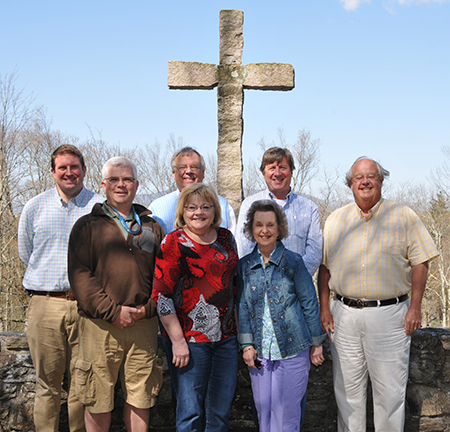Strengthening the Church
 |
For Presbyterian churches to grow in the modern age, worship and learning need to be strong and meaningful. In some cases creative, nontraditional styles, done with integrity, will need to emerge in new locations. Churches also need strong, innovative pastors and leaders, committed to following Jesus Christ. Many of those pastors will need new skills in how to respond to new challenges, new technology, and new ways of communicating. They will need support as they lead. Churches and Sessions need encouragement, training, and support in order to step out in faith and grow in outreach and worship. Presbytery will provide resources, opportunities for learning, and partnership in this changing environment. The Holy Spirit is at work in our presbytery and we need to join in the work.
Description of Project:
Since the Presbytery was formed, our purpose has been strengthening congregations and pastors to be witnesses to Jesus Christ. Our Mission is “SEE we are the Body of Christ: Strengthening Congregations, Equipping Disciples, and Engaging in Mission Together.” This includes exploring new worshiping communities and new ways of “doing church” along with development of growing congregations. This is expressed by fostering new initiatives and outreach to unchurched people while moving struggling churches to strong churches, and strong ones to greater strength. We have done this by using tools like Acts Initiative, to help churches think of new ways of ministry, New Beginnings, assessment for better decision making about the future, Small Church and Presbyterian Foundation forums, and support of newly ordained pastors in the For Such a Time as This program. We continue to explore new ways to strengthen churches and pastors.
Another key component that needs strengthening is better support for clergy and other church leaders. We plan to bring into the presbytery opportunities for learning that engage leaders of our churches of all membership sizes. Helping people attend conferences such as “Next Church” connects people with new ideas and best practices. Cohort programs, like Macedonia Ministry support pastors, provide new knowledge and nurture spiritual growth. Well trained and energized leaders help congregations grow and find positive ways to impact their communities.
Another challenge facing many of our churches is the effective use of modern technology and media, including web-sites, social media, audio visuals for worship, on-line giving, new ways to tell our stories, and others. The desired outcome is to more effectively communicate the message of Christ’s love to multiple generations of disciples and potential disciples.
Rationales and Impact for Project:
In partnership together with over a hundred Presbyterian churches of varying sizes scattered across the western one third of NC, PWNC helps churches and members accomplish together what is difficult to do alone. Jesus Christ is known and celebrated in new ways with each generation. Vital congregations, while maintaining worship integrity and nurturing the long-faithful, innovate and strive to welcome new people into their midst. The local congregation, charged by the Holy Spirit, remains the most significant venue where this can happen. Spiritual and financial support enables and assures this ever evolving landscape. More resources are needed to provide the necessary tools for exploring yet unknown arenas of ministry, encourage bold thinking, and encourage intentional risk taking. Many churches are struggling to address new needs. PWNC wants to be ready to help pastors and leaders make the best decisions possible in following God’s will.
Meaningful technology which will allow congregations to communicate effectively with members and strangers in telling the Good News by use of:
| Development and funding of appropriate technology for ministry and worship, establishing a way for churches to share equipment, software, etc. | $60,000 |
| Creation of websites for all churches who want to use them. | $ 2,500 |
| A consultant for help with media, marketing, and technology development | $60,000 |
| Subtotal | $122,500 |
Total Essential Goal $509,500
Dream Goal Planned Expenditures:
| Additional dollars for church leadership/pastoral support | $105,000 |
| Improved audio visual and technology needed for ministry | $20,000 |
| Macedonia Ministry Support | $160,000 |
| Non-traditional New Church(s) Development | $100,000 |
Total Dream Goal $385,000
Essential Goal and Planned Expenditures:
The overall goal is to reach, develop, and teach (new) disciples with the three following initiatives:
Vital churches who reinvigorate themselves and reach the unchurched by use of:
| Assessment tools to allow them to see themselves realistically and make wise decisions for their future, such as, New Beginnings. | $25,000 |
| Small Water to Wine grants for new and innovative outreach. | $30,000 |
| Support for churches with New Worshiping Communities. | $85,000 |
| Subtotal | $140,000 |
Strengthened leadership that can effectively guide congregations, changing from inward focus to reaching out into their communities, by use of:
| Major workshops targeting leaders of both large and small congregations. | $27,000 |
| Initiatives that strengthen pastors, such as Macedonia Ministry, to gain practical knowledge, grow in faith, lead their churches in positive change, and make an impact on the community. | $25,000 |
| Financial backing for additional leadership for bold new ministries and growing churches that provides pastoral assistance and encourages church growth. Examples might include the use of seminary interns, music or youth leaders, or program support persons. | $85,000 |
| Continued financial support for churches that have potential to grow and be sustainable with a pastor in an intentional mentoring program, such as the Pastoral Residence Program. | $85,000 |
| Scholarship support for pastors to attend continuing education programs or special training events, such as Next, preaching seminars, Big Tent, etc. | $25,000 |
| Subtotal | $247,000 |
Goal Sustainability and Accountability:
The General Council is responsible for the work of presbytery. Specific projects will be undertaken by the Church Development Committee, the Smaller Membership Church Committee, and other task forces and committees. The comptroller will monitor expenses and will be checked by the annual audit. In addition, any church receiving funds would be expected to evaluate its progress and submit reports to the Presbytery on a regular basis. However, the overall evaluation and monitoring will be the responsibility of the General Council, who will report the results to the Presbytery on a regular basis at its meetings.
